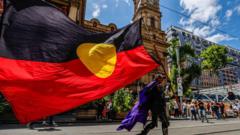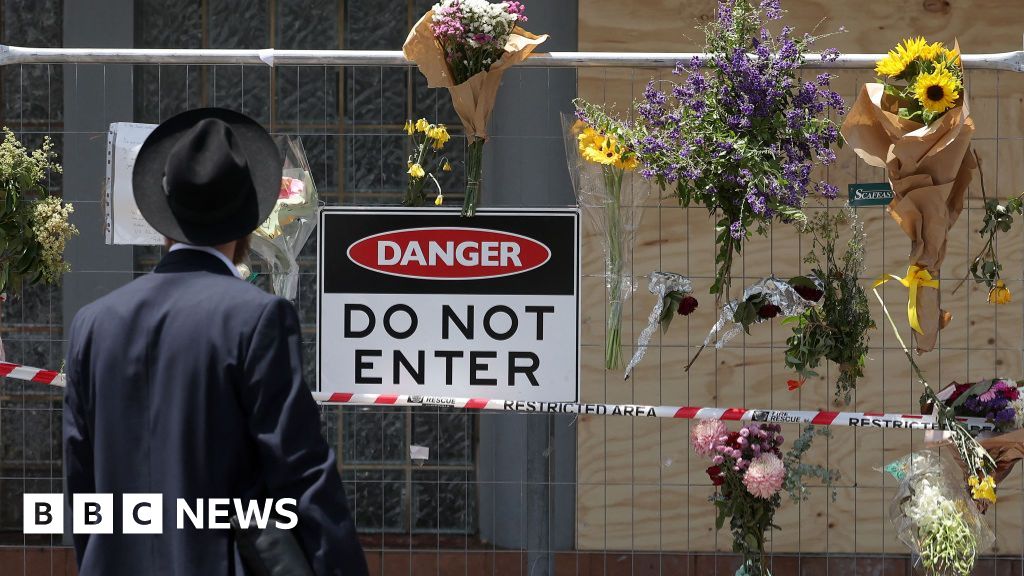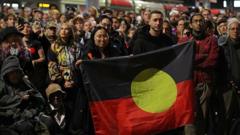In the vibrant yet stark setting of Yarrabah, an indigenous community in Far North Queensland, the anticipation of a national election blends with a disheartening silence regarding Indigenous issues. The overwhelming absence of election posters and candidate visits underscores a disconnection that chief executive Suzanne Andrews of Gurriny Yealamucka Health Services feels acutely. "We're not being engaged," she notes, reflecting on the lack of focus on Aboriginal concerns during this election cycle.
With Indigenous Australians making up only 3.8% of Australia’s population, socioeconomic disparities are pronounced. Yet, in recent debates, both Prime Minister Anthony Albanese and Opposition leader Peter Dutton overlooked Aboriginal and Torres Strait Islander matters. Dutton's controversial remark labeling "welcome to country" ceremonies as excessive served as the rare exception in a campaign largely devoid of discussions about Indigenous rights or policies, leaving many in Yarrabah disillusioned.
This apathy may stem from the shock of the 2023 Voice to Parliament referendum, which ended in a significant rejection by 60% of voters. It has since discouraged political leaders from engaging with First Nations issues, as they are deemed too contentious and electorally perilous. Following this setback, Andrews mournfully asserts that political parties now prefer to "play it safe" rather than confront "hot Aboriginal issues".
Critics from various political spectrums have echoed concerns about the prevailing avoidance of Indigenous topics. Prominent figures, such as independent senator Lidia Thorpe, argue that Albanese has become reticent, fearing backlash from a failed electoral initiative that was initially positioned as a path to reconciliation. Thorpe believes leaders should leverage this election to acknowledge ongoing injustices faced by Indigenous peoples.
Despite years of efforts like the Closing the Gap strategy aimed at reducing Indigenous disadvantage, progress remains stagnant—with only four key measures on track and escalating incarceration rates demonstrating a dire reality. Professor Rodney Smith from the University of Sydney underscores the electoral risks, asserting the defeat of the Voice referendum has made it "foolish" for politicians to focus on Indigenous issues.
Recent studies indicate a decline in public willingness to prioritize equity for Indigenous Australians, further discouraging main political parties. Some observers, including independent MP Bob Katter, admit that while they care personally, addressing such topics on the campaign trail is a risky endeavor.
The impact of the referendum's fallout is deeply felt, with surges in racial hostility noted in recent reports. Indigenous individuals have voiced the emotional and social toll of leading up to the vote, perpetuating an environment of fear and alienation from political discourse. Many now opt to withdraw altogether from a system that often overlooks their voices.
As the election approaches, community members express a yearning for visibility and in-depth engagement with their challenges. With political dialogue veering away from Indigenous affairs, a crucial opportunity for change slips away—a reality many hope does not define Australia's immediate political future.
With Indigenous Australians making up only 3.8% of Australia’s population, socioeconomic disparities are pronounced. Yet, in recent debates, both Prime Minister Anthony Albanese and Opposition leader Peter Dutton overlooked Aboriginal and Torres Strait Islander matters. Dutton's controversial remark labeling "welcome to country" ceremonies as excessive served as the rare exception in a campaign largely devoid of discussions about Indigenous rights or policies, leaving many in Yarrabah disillusioned.
This apathy may stem from the shock of the 2023 Voice to Parliament referendum, which ended in a significant rejection by 60% of voters. It has since discouraged political leaders from engaging with First Nations issues, as they are deemed too contentious and electorally perilous. Following this setback, Andrews mournfully asserts that political parties now prefer to "play it safe" rather than confront "hot Aboriginal issues".
Critics from various political spectrums have echoed concerns about the prevailing avoidance of Indigenous topics. Prominent figures, such as independent senator Lidia Thorpe, argue that Albanese has become reticent, fearing backlash from a failed electoral initiative that was initially positioned as a path to reconciliation. Thorpe believes leaders should leverage this election to acknowledge ongoing injustices faced by Indigenous peoples.
Despite years of efforts like the Closing the Gap strategy aimed at reducing Indigenous disadvantage, progress remains stagnant—with only four key measures on track and escalating incarceration rates demonstrating a dire reality. Professor Rodney Smith from the University of Sydney underscores the electoral risks, asserting the defeat of the Voice referendum has made it "foolish" for politicians to focus on Indigenous issues.
Recent studies indicate a decline in public willingness to prioritize equity for Indigenous Australians, further discouraging main political parties. Some observers, including independent MP Bob Katter, admit that while they care personally, addressing such topics on the campaign trail is a risky endeavor.
The impact of the referendum's fallout is deeply felt, with surges in racial hostility noted in recent reports. Indigenous individuals have voiced the emotional and social toll of leading up to the vote, perpetuating an environment of fear and alienation from political discourse. Many now opt to withdraw altogether from a system that often overlooks their voices.
As the election approaches, community members express a yearning for visibility and in-depth engagement with their challenges. With political dialogue veering away from Indigenous affairs, a crucial opportunity for change slips away—a reality many hope does not define Australia's immediate political future.



















